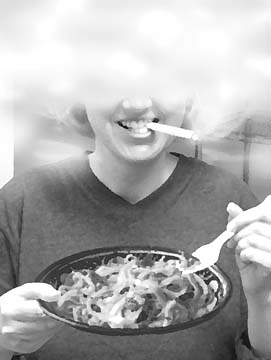


![]()
Talk Story
 |
Restaurant
smoking ban
worth the waitWHEN my dad died, he was 56 years old. He'd smoked cigarettes for 40 years, since he turned 16 -- unfiltered Chesterfields and Pall Malls mostly. If the apple doesn't fall far from the tree, chances are he'd been puffing secretly for a couple of years before that. I did.
He quit once, in his late 40s. For six months he snacked on candy and popcorn to ease the nicotine cravings and ballooned from 160 pounds to more than 200 before he started smoking again.
He tried to cut back, but soon he was back to a pack and a half a day. The weight went away, but so did his chances.
Lung cancer is a painful way to go. I hope the medications have improved since the late 1970s when Dad lost his battle. He spent the last weeks at home in a hospital bed the American Cancer Society people set up in the den. It was like watching someone drown, except that it was excruciatingly slow.
Two weeks from now, I'll celebrate my own 56th birthday.
I quit smoking the day I learned my dad had terminal cancer. Twenty-five years later, I still recall my mother's telephone call -- where I was standing, the pattern of the tile on the floor, the sound of her voice.
I'd been smoking myself for 15 years the day I got the news. I quit, cold turkey. Any cravings or second thoughts disappeared the day I watched him die.
As George W. Bush says, good can came out of evil.
Most smokers, I suppose, haven't had the benefit of a confrontation with smoking's mortal consequences, but there are other motivations to quit.
An article about state cigarette taxes caught my attention this week. Hawaii's levy is now exceeded only by Washington's ($1.425) and New York's ($1.11). At $1 per pack, it's the same as Alaska's, Maine's and Rhode Island's.
You won't be surprised to know that the lowest taxes are in tobacco country: Kentucky (3 cents), North Carolina (5 cents), South Carolina (7 cents) and Tennessee (13 cents). In erstwhile Marlboro Country, Wyoming (12 cents) has one of the lowest taxes, too.
Michael Bloomberg, New York's new mayor, proposes boosting the city's excise tax on cigarettes to $1.50 from 8 cents a pack -- balancing the municipal budget on the backs of the addicted. That would increase the price to $7 a pack and encourage smuggling across the Hudson from New Jersey, where they still go for about $4.
Public health advocates argue cigarette taxes are progressive, since the poorest smokers are most likely to quit and enjoy the financial and health benefits. Tobacco companies insist that they are regressive, since smokers tend to be poorer --and less educated -- than non-smokers.
The less educated are killing their betters with secondhand smoke -- reverse Darwinism at work.
When I quit, a pack cost less than today's Hawaii tax. At an overseas U.S. Army PX, I once bought cartons for $2 apiece, or 20 cents a pack, a penny per smoke. Those were the days of "smoke 'em if you've got 'em" -- assisted suicide in the military.
A pack now sells for $4.89 at Hawaii groceries, or about 25 cents a smoke. That should be enough to make people quit. However, nicotine seems to blind smokers to the dirt, wrinkled skin, stained teeth and fingers, coughing, inconvenient midnight shopping trips, scrounging butts from ashtrays, stale smell in the car, confinement to outdoor smoking areas in bad weather, annoying non-smokers ... the list goes on.
Pardon me, smokers. I know nothing's worse than listening to someone who has quit.
Mayor Jeremy Harris quickly signed a city ordinance this week that will ban smoking in restaurants in Honolulu, starting on July 1.
He'd probably agree that this is an intrusion into personal freedoms that might negatively affect tourism. In fact, the mayor vetoed a similar restaurant smoking ban seven years ago when restaurateurs argued they could take care of the secondhand smoke problem themselves. They didn't.
Having lost both his parents to lung cancer, Harris was willing to do the right thing this time, putting public health ahead of year-over-year food and beverage revenues.
I understand why.
John Flanagan is the Star-Bulletin's contributing editor.
He can be reached at: jflanagan@starbulletin.com.